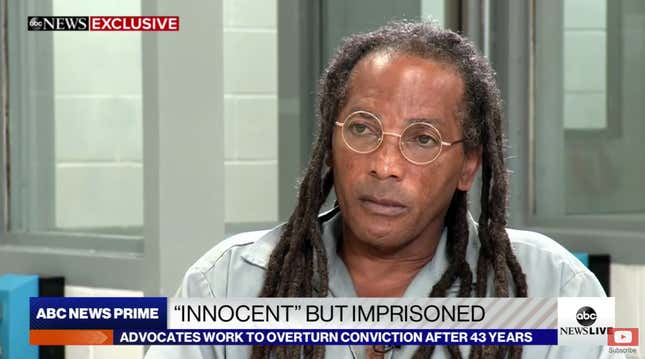
Kevin Strickland has been fighting for his freedom for 43 years.
Sentenced to life in prison in 1979, Strickland, a Black man, is now 62. He has tried 17 times to get a hearing to overturn his triple murder conviction and on Monday he finally had his day in court.
“Finally somebody’s going to pay attention to my pleas of innocence,” he said, according to NBC affiliate KSHB. Strickland provided testimony during the first evidentiary hearing in his case.
ABC News reports Jackson County Prosecutor Jean Peters Baker and Strickland’s personal attorney Robert Hoffman, both say that Strickland was wrongfully convicted for the murders that took place in Kansas City, Missouri in 1978.
From ABC:
Strickland, 62, was convicted in the April 25, 1978, fatal shootings of Larry Ingram, 21; John Walker, 20; and Sherrie Black, 22, in Kansas City.
Strickland, a Black man, saw his first trial end in a hung jury when the only Black juror, a woman, held out for acquittal. After his second trial in 1979, he was convicted by an all-white jury of one count of capital murder and two counts of second-degree murder.
Strickland has always maintained that he was home watching television and had nothing to do with the killings, which happened when he was 18 years old.
Two other men convicted in the killings later insisted that Strickland wasn’t at the crime scene, The Kansas City Star reported. And before she died, Cynthia Douglas, the only eyewitness to the killings, recanted her testimony that Strickland was the shooter.
Attorneys for Strickland and the Attorney General’s office indicated during opening statements that the statements from Douglas identifying Strickland as the shooter would be central to determining Strickland’s fate.
On Monday, Strickland denied suggestions that he offered Douglas $300 to “keep her mouth shut,” and said he had never visited the house where the murders occurred before they happened.
Strickland who was wheeled into the courtroom on Monday, a sufferer from spinal stenosis, trusted that he’d be found innocent when he cooperated with the police. He said he just “knew the system worked and I would not be convicted of something I didn’t do,” ABC reports.
According to the Kansas City Star, federal prosecutors in western Missouri, Jackson County’s presiding judge, Kansas City Mayor Quinton Lucas, more than a dozen lawmakers and the Midwest Innocence Project are supporting Strickland’s exoneration.
The Star notes that if Strickland is exonerated, then his time will go down as the longest known wrongful conviction in Missouri history.
The Missouri attorney general’s office still believes that Strickland is guilty according to the evidence, KSHB reports.
More from KSHB:
Peters Baker asked him if he entered the house where the murders happened, or if he waited in the car outside the house.
“By no means was I anywhere near that crime scene,” Strickland repeated after both questions.
Strickland did admit he gave shotgun shells to Vincent Bell, but said it was weeks before the murders and was not for the purpose of shooting anyone.
He also noted he frequently drove Bell’s car since Bell did not have his own driver’s license.
Bell was one of two other co-defendants convicted in the murders. He also acknowledged he was was being a “smart aleck” with police in his original interview and recognizes the perception that gives people about him.
Strickland also said he was drunk and possibly high during the arrest and interview, and he regrets some the statements he made to police at the time.
The attorney general’s representatives alleged this is the first time Strickland has, on the record, said he was inebriated during the interview, though Strickland argued he hadn’t been given the opportunity to give that information before.
Strickland told KHSB that he is “happy, hopeful,” about being in the courtroom after four decades.

